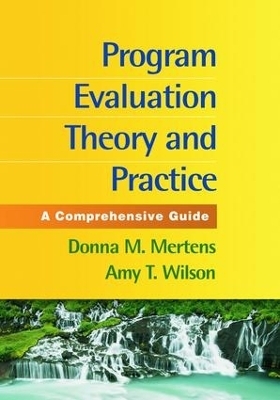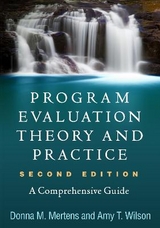
Program Evaluation Theory and Practice, First Edition
Guilford Press (Verlag)
978-1-4625-0315-5 (ISBN)
- Titel erscheint in neuer Auflage
- Artikel merken
A comprehensive, practical text that includes many useful pedagogical features
Discusses how to plan and conduct evaluations from different theoretical positions and for multiple purposes, with attention to cultural issues throughout
Quantitative, qualitative, and mixed methods approaches are covered in a balanced fashion
Lead author Mertens is a prominent, award-winning educator and evaluator
Donna M. Mertens is Professor in the Department of Educational Foundations and Research at Gallaudet University, where she teaches advanced research methods and program evaluation to deaf and hearing students. She received the Distinguished Faculty Award from Gallaudet. The primary focus of her work is transformative mixed methods inquiry in diverse communities, with priority given to the ethical implications of research in pursuit of social justice. A past president of the American Evaluation Association (AEA), Dr. Mertens provided leadership in the development of the International Organization for Cooperation in Evaluation and the establishment of the AEA Diversity Internship Program with Duquesne University. She has received AEA’s highest honors for service to the organization and the field, as well as for her contributions to evaluation theory. She is the author of several books and is widely published in major professional journals. Dr. Mertens conducts and consults on evaluations in many countries, including Egypt, India, South Africa, Botswana, Israel, Australia, New Zealand, and Costa Rica. Amy T. Wilson is Director of International Programs at the Mill Neck Family of Organizations, where she leads a team of deaf educational specialists who share their expertise, knowledge, and technical skills with parents, educators, and professionals in economically poor countries. Dr. Wilson was a professor in the Department of Educational Foundations and Research at Gallaudet University for 14 years. After living in developing countries and noting the poor assistance people with disabilities were receiving from U.S. development organizations, she developed Gallaudet’s MA degree in International Development. The degree, which is the only one of its kind in the United States, focuses on the inclusion of people with disabilities in development assistance programs and in nongovernmental, federal, and faith-based development organizations both in the United States and overseas. Dr. Wilson was Program Director of the International Development Program; she also taught deaf and hearing students research and evaluation, theory and practice of international development, micropolitics, community development with people with disabilities, multicultural education, and gender, disability, and development. Dr. Wilson evaluates and advises development organizations and agencies (e.g., U.S. Agency for International Development, the InterAmerican Development Bank, the World Bank, and the Peace Corps) about the inclusiveness of their programs, as well as their effectiveness with various disability communities.
I. The Landscape of Evaluation 1. Introduction to Evaluation: Defining Terms and Ethical Considerations 2. Framing Evaluation: Paradigms, Branches, and Theories II. Historical and Contemporary Evaluation Paradigms, Branches, Theories, and Approaches 3. The Postpositivist Paradigm and the Methods Branch 4. The Pragmatic Paradigm and the Use Branch 5. The Constructivist Paradigm and the Values Branch 6. The Transformative Paradigm and the Social Justice Branch III. Planning Evaluations 7. Working with Stakeholders: Establishing the Context and the Evaluand 8. Evaluation Purposes and Questions 9. Evaluation Designs 10. Data Collection Strategies and Indicators 11. Stakeholders, Participants, and Sampling 12. Data Analysis and Interpretation IV. Implementation in Evaluation 13. Communication and Utilization of Findings 14. Meta-Evaluation and Project Management 15. Perennial and Emerging Issues in Evaluation Glossary
| Erscheint lt. Verlag | 17.4.2012 |
|---|---|
| Verlagsort | New York |
| Sprache | englisch |
| Maße | 178 x 254 mm |
| Gewicht | 1120 g |
| Themenwelt | Geisteswissenschaften ► Psychologie |
| Studium ► Querschnittsbereiche ► Prävention / Gesundheitsförderung | |
| Sozialwissenschaften ► Pädagogik ► Sozialpädagogik | |
| Sozialwissenschaften ► Soziologie ► Empirische Sozialforschung | |
| ISBN-10 | 1-4625-0315-2 / 1462503152 |
| ISBN-13 | 978-1-4625-0315-5 / 9781462503155 |
| Zustand | Neuware |
| Haben Sie eine Frage zum Produkt? |
aus dem Bereich



